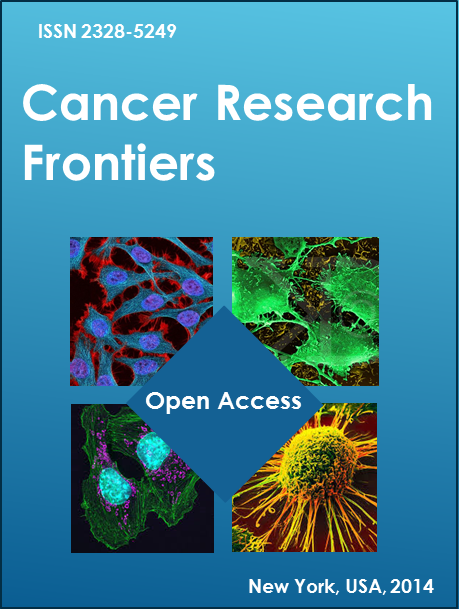Abstract _ Full Text (HTML) _ Full Text (PDF)
Review
Cancer Research Frontiers. 2017; 3(1): 29-50. doi: 10.17980/2017.29
Personalisation of Therapy – clinical impact and relevance of genetic mutations in tumours
Terri McVeigh*, Angela George.
Cancer Genetics Unit, Orchard House, The Royal Marsden NHS Foundation Trust, Downs Road, Sutton, SM2 5PT, London, UK.
*Corresponding author: Terri McVeigh, Clinical Research Fellow, Cancer Genetics Unit, Orchard House, The Royal Marsden NHS Foundation Trust, Downs Road, Sutton, SM2 5PT, London, UK. Tel: (+44) 0208 661 3375, email:
Citation: Terri McVeigh, et al. Personalisation of Therapy – clinical impact and relevance of genetic mutations in tumours. Cancer Research Frontiers. 2017; 3(1): 29-50. doi: 10.17980/2017.29
Copyright: @ 2017 Terri McVeigh, et al. This is an open-access article distributed under the terms of the Creative Commons Attribution License, which permits unrestricted use, distribution, and reproduction in any medium, provided the original author and source are credited.
Competing Interests: The authors declare no competing financial interests.
Received Oct 23, 2016; Revised Mar 9, 2017; Accepted Mar 13, 2017. Published Mar 25, 2017
Abstract
As technological advances in genetic sequencing and the parallel reduction in costs of sequencing make testing more accessible, genomic profiling of tumours is increasingly becoming integrated into routine clinical care. This personalisation of medical care is especially relevant in the area of oncology, where interest in tumour testing as part of standard care has dramatically increased. Tumour genomic profiles are particularly interesting, as they harbour mutations acquired temporally as somatic events, and less commonly, may reveal defects that have been inherited through the germline. Numerous techniques can be utilised to interrogate the tumour genomic landscape, ranging from tried and tested techniques, such as karyotyping, to full mutational analysis using more modern next and third generation technologies. The challenge for the clinician is no longer predominantly in accessing genomic technologies, but rather in interpreting complex reports, and separating relevant clinically actionable mutations from incidental mutations reflective of the damaged DNA repair mechanisms that are intrinsic to the neoplastic process. This may be especially difficult if the mutational spectrum includes variants in less well-studied genes, or in genes not commonly implicated as drivers of the cancer under investigation. Increasing utilisation of genomic profiling of cancers has informed our understanding that the timing of a mutation in a particular gene is as relevant as the gene in which it occurs in determining the neoplastic course. Once the key driver mutations in a cancer have been identified, the next challenge is to find and utilise an appropriate agent that targets the specific defect. Many hundreds of targeted agents have been designed and put through rigorous in vitro and phase 1 or even phase 2 trials, but few have made it into routine clinical use to date. In this review, we discuss the underlying mechanisms of genomic changes and mutational signatures that can be potentially targeted for therapeutic benefit, and some successful targeted agents that have been developed to date.
Keywords: Precision Medicine; Mutational Signature; Driver Mutations; inherited predisposition








